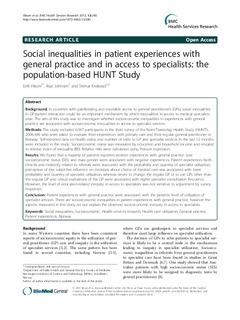| dc.contributor.author | Vikum, Eirik | nb_NO |
| dc.contributor.author | Johnsen, Roar | nb_NO |
| dc.contributor.author | Krokstad, Steinar | nb_NO |
| dc.date.accessioned | 2014-12-19T14:23:02Z | |
| dc.date.available | 2014-12-19T14:23:02Z | |
| dc.date.created | 2013-10-22 | nb_NO |
| dc.date.issued | 2013 | nb_NO |
| dc.identifier | 658695 | nb_NO |
| dc.identifier.issn | 1472-6963 | nb_NO |
| dc.identifier.uri | http://hdl.handle.net/11250/264551 | |
| dc.description.abstract | Background: In countries with gatekeeping and equitable access to general practitioners (GPs), social inequalities in GP-patient interaction could be an important mechanism by which inequalities in access to medical specialists arise. The aim of this study was to investigate whether socioeconomic inequalities in experiences with general practice are associated with socioeconomic inequalities in access to specialist services.
Methods: The study included 6,067 participants in the third survey of the Nord-Trøndelag Health Study (HUNT3, 2006–08) who were asked to evaluate their experiences with primary care and their regular general practitioner in Norway. Self-reported data on health status and number of visits to GP and specialist services in the last 12 months were included in the study. Socioeconomic status was measured by education and household income and rescaled to relative index of inequality (RII). Relative risks were calculated using Poisson regression.
Results: We found that a majority of patients reported positive experiences with general practice. Low socioeconomic status (SES) and male gender were associated with negative experiences. Patient experiences both directly and indirectly related to referrals were associated with the probability and quantity of specialist utilization: perception of low subjective influence on decisions about choice of medical care was associated with lower probability and quantity of specialist utilization, whereas desire to change the regular GP or to use GPs other than the regular GP and critical evaluations of the GP were associated with higher specialist consultation frequency. However, the level of education-related inequity in access to specialists was not sensitive to adjustment by survey responses.
Conclusion: Patient experiences with general practice were associated with the patients’ level of utilization of specialist services. There are socioeconomic inequalities in patient experiences with general practice, however the aspects measured in this study do not explain the observed socioeconomic inequity in access to specialists. | nb_NO |
| dc.language | eng | nb_NO |
| dc.publisher | BioMed Central | nb_NO |
| dc.title | Social inequalities in patient experiences with general practice and in access to specialists: the population-based HUNT Study | nb_NO |
| dc.type | Journal article | nb_NO |
| dc.type | Peer reviewed | nb_NO |
| dc.source.pagenumber | 1-8 | nb_NO |
| dc.source.volume | 13 | nb_NO |
| dc.source.journal | BMC Health Services Research | nb_NO |
| dc.contributor.department | Norges teknisk-naturvitenskapelige universitet, Det medisinske fakultet, Institutt for samfunnsmedisin | nb_NO |
